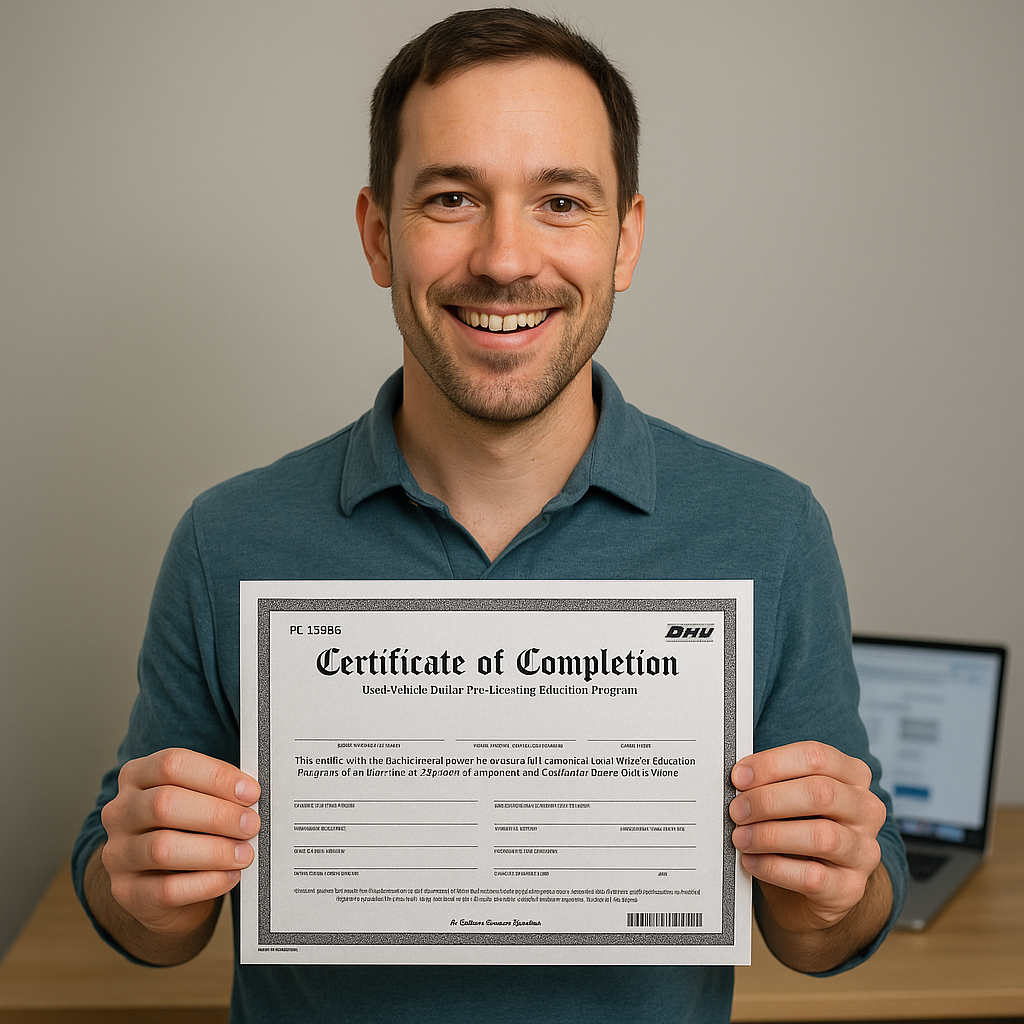You Got Your California Dealer Certificate - Now What?
August 6th, 2025 by Garrett Eddings
You Got Your California Dealer Certificate...Now What? A Step-by-Step Guide to Setting Up Your Dealership
Completing your California DMV-approved dealer education course and passing the exam is a huge milestone. You’ve invested the time, studied the material, and earned your certificate. It’s a moment worth celebrating.
But if you’re like most new dealer applicants, your next thought is probably: What now?

The Real Work Starts Now
Many people assume that getting certified is the hard part, but the truth is — it’s just the beginning. Moving from certificate holder to fully licensed dealer with a functional, compliant dealership requires a lot more than most realize.
This article will walk you through what happens after your education certificate — breaking down each part of the process and highlighting tips, best practices, and potential pitfalls along the way.
Step 1: Understanding the Digital DMV Dealer License Application
California’s DMV has transitioned the entire dealer license process to a digital platform. You’ll use the DMV’s Occupational Licensing Portal to submit every part of your application online.
What you’ll need to upload includes:
- Dealer education certificate
- Business formation docs (LLC, EIN, FBN)
- City business license
- Lease or ownership documents
- Color photos of lot, signage, and office
- Surety bond certificate
- Garage liability insurance (COI)
- Live Scan receipt
- Personal history forms
Make sure every document is in the correct format, labeled properly, and submitted in full. Incomplete or incorrect submissions cause long delays.
Step 2: Choosing and Forming Your Business Entity
Before applying for your license, you need to legally form your business. Most dealers choose one of the following:
- LLC: Flexible and offers liability protection
- S-Corp: Useful for multi-partner setups or tax strategy
- Sole Proprietor: Easiest, but not recommended for dealers
You’ll also need to register with the IRS (for your EIN) and file a Fictitious Business Name (FBN) if applicable.
Note: California Dealer Academy does not offer legal or financial advice. We partner with a law office to help clients form their corporation if needed.
Step 3: Finding a DMV-Compliant Location
Your dealership must meet DMV and city zoning requirements. It must:
- Be zoned for vehicle sales by your local jurisdiction
- Have a permanent, legible sign with letters at least 2 inches tall
- Include a display area (if retail)
- Have a functioning office with desk, file cabinet, and phone
Check with your city planning department before leasing a space. Some cities are extremely restrictive about auto sales zoning.
Step 4: Getting Your Dealer Bond and Insurance
Every California dealer must have a:
- Surety bond: $50,000 for most dealers, $10,000 for limited wholesale
- Dealer garage liability insurance policy
You’ll need to upload proof of both during your DMV application.
Step 5: Submitting Your Application
Once everything is gathered, log into the DMV portal, complete the form, and upload all documents.
The DMV reviews complete applications in about 2–4 weeks, but missing info or incorrect documents can delay it significantly.
Step 6: Preparing for the DMV Inspection
The DMV will inspect your dealership location before approving your license. Be ready with:
- Proper signage installed
- Office space fully furnished
- Inventory displayed (if applicable)
- Forms and logs ready to show
Consider a mock inspection with a consultant to ensure success.
Step 7: Getting Auction Access
Once licensed, you can register with:
- Manheim
- Copart / IAA
- AuctionACCESS
You’ll need your license, COI, and bond certificate to gain access. This is how most dealers buy their inventory.
Step 8: Setting Up Compliance Systems
Once operational, California dealers must maintain:
- Inventory log book
- Buyer's guide forms
- DMV contracts and disclosures
- Book of registry
Compliance is essential. Keep your documents organized and accessible in case of a DMV audit.
Feeling Overwhelmed?
You're not alone. Many dealers find that the hardest part of starting their business isn’t the course — it’s everything that comes afterward. From zoning to insurance to inspections, it’s a lot to navigate solo.
Done-for-You Dealership Setup (Optional)
At California Dealer Academy, we help new dealers go from certificate to licensed and open — faster and with less stress.
We offer:
- Full digital DMV application support
- Zoning and signage coaching
- Inspection readiness prep
- Bond and insurance guidance
- Post-license support (auction, forms, compliance)
Need help forming your corporation? We’ll refer you to our legal partner to handle that part.
Posted in: Education
